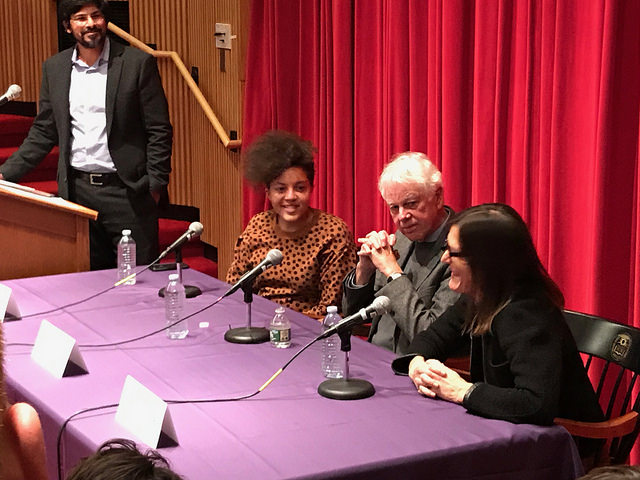Top journalists from around the country, representing several different media companies, came to Amherst College on Thursday to speak on the shift of information in the modern age as part of a panel titled, “The Changing Landscape of News and Media.”
The event featured New York Times journalist and Pulitzer Prize winner Kate Zernike, Boston Globe and ESPN sports writer Bob Ryan and Senior Politics Reporter at Vox, Jane Coaston.
The event was put on as a part of Amherst LEADS, a leadership development program designed to prepare students for life after college. It was moderated by Amherst College professor and chair of the Amherst College philosophy department Nishiten Shah.
Shah kicked off the event by introducing the panelists and asking them how the media has changed for the better and for the worse within the last 10 years. Coaston wasted no time in her response, describing what she referred to as “the flattening of media” and “elimination of information guardrails,” where the public can get news from hundreds of different sources, regardless of credibility.
“There used to be a time when, if you were a major media outlet, you were trusted as someone who has worked really hard to understand the issues you report on,” Coaston said. She described how many people consider all media outlets, from Snapchat and Instagram to the New York Times and Washington Post to be “on the same level,” when in reality, some of that information just isn’t accurate or reliable.
Zernike gave a different outlook, recounting how, in her time as a reporter, the public as a whole is far more informed than it used to be.
“I can’t begin to tell you how many people I spoke to just 10 years ago who had no knowledge of the issues I was reporting on.” Zernike said. “This year, when I was asking people about the Kavanaugh hearings, everyone had an opinion. People’s ability now to gather and mobilize on information has been really impressive, and great for civic discourse.”
Ryan gave his take on the widespread availability of information and how it impacts reporting in sports. “The thing that disturbs me the most about the dissemination and absorption of information is a lack of perception in the sports world,” Ryan said.
He explained how some aspects of sports that “used to and should be evaluated on a long-term basis” are now reported on a short-term basis, resulting in information being “distorted, overheated and taken out of context.”
“The thing that’s most prized is conflict and having a difference of opinion – something that will spark a heated debate,” Ryan said. “And often, the debate is artificial. It’s manufactured. Real perspective has been lost there.”
Ryan went on to describe the merits of instant access to information, joking about his experience as a reporter decades before cellphones and computers made data so readily available.
“Sometimes finding a single statistic could take more than a week. Now, I can find it myself, right here,” he said, pointing to his cell phone. “That’s a huge bonus.”
Led by Shah, the panelists went on to discuss topics such as modern attitudes towards journalists, polarization of politics, objectivity in journalism and fake news.
Zernike acknowledged the attitudes toward the media as being “elitist and snobby,” saying the blame falls on journalists themselves for not speaking more to the public.
“Political reporting especially has talked only to the experts and the pundits,” Zernike said. “I think we have done a really poor job of talking to voters and listening to what they actually care about. It’s created a real us-versus-them scenario in our politics.”
Coaston spoke ardently on tribalism in politics, arguing there has never really been a time in American history when people truly agreed on the issues at hand – there’s simply more diversity of opinion and greater visibility today than ever before.
“When we talk about boutique media, I think it’s important to note that when there were basically three networks, people who looked like me were not on any of those networks.” Coaston said.
“There’s something to be said for the fact that there are more voices and more perspectives out there. There was never a time when politics were not tribal. We’re just living in a time when our tribalism is most visible,” she said.
When it came down to objectivity in journalism, Zernike argued that it doesn’t truly exist.
“Simply deciding to cover one story over another is a subjective decision,” Zernike said. “The idea that there’s anything close to pure objectivity in journalism has always been wrong.”
“However,” she conceded, “objectivity is the act of striving to present the facts as best as you can, and getting as many perspectives as you can. Propaganda is what results when you represent only your side.”
Coaston added onto this idea, drawing on recent issues with fake news. She asserted that not only do many people listen solely to one-sided opinions simply because they agree with them, but they also actively disregard real information just because they don’t like the facts they’re presented with.
“Bad things happen. Things that you might want to happen, won’t happen. That’s doesn’t make it fake news, it’s just reality,” Coaston said.
Ryan agreed, explaining that many news organizations have been left struggling with impossible standards for reporting.
“If you say ‘Happy Mother’s Day’ on the air, people will write in asking why you don’t like your father,” Ryan laughed. “You can never please everyone, but you can provide them with the truth.”
Rachel Swansburg can be reached at [email protected].



















